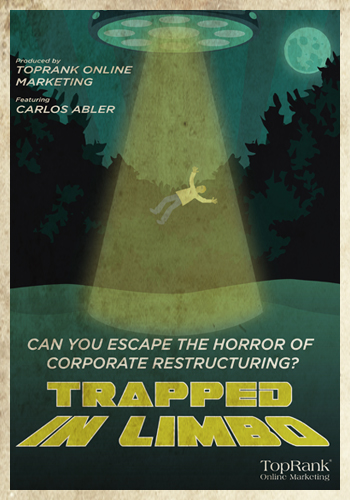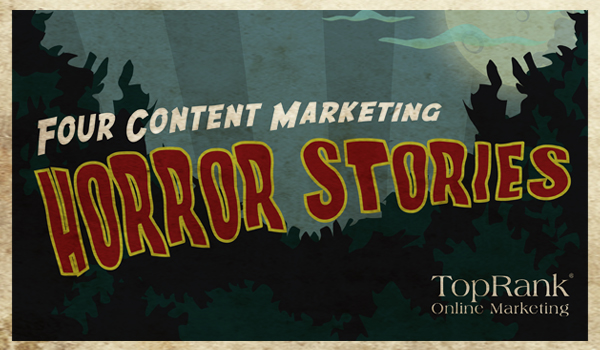
If content marketing stories were movies, most of the ones we hear today would be romantic comedies. Brands all over the world are telling stories of how they overcame obstacles and beat the odds to make their customers fall in love with them.
While these stories are inspiring, sometimes content marketing isn’t all flowers and chocolates and happy endings. Sometimes well-intentioned marketers end up in a cabin in the woods, hearing the unmistakable roar of a chainsaw approaching.
While they’re not pleasant for any marketer to experience, content marketing horror stories can teach valuable lessons. We can learn as much from failure as we do from success–perhaps even more so.
So in honor of Halloween, we asked marketing superstars from 3M, NewsCred, Content Marketing Institute and LinkedIn to share their most harrowing tales of content marketing gone wrong. Prepare to be edified and terrified with these 4 hair-raising content marketing horror stories.
Michael Brenner (@BrennerMichael)
Head of Strategy, NewsCred
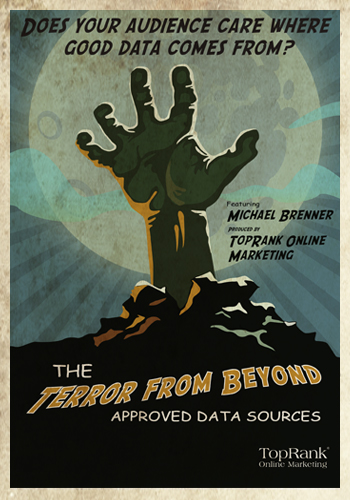
My personal content marketing horror story involved a member of my team covering a competitor’s piece of research in a well-written blog post. The research was actually conducted by an independent firm but sponsored by a competitor. It was hosted on the independent firm’s landing page but heavily promoted visually by the competitive brand.
We published the article. It performed very well and was even tweeted by the VP of Sales for that solution. The VP of Marketing for the same solution saw the tweet, followed the breadcrumbs back to our competitor and suggested to me that I should be fired.
Turns out, the article drove thousands of visitors to our branded content hub. It drove hundreds of people to our solution pages and only a dozen or so to the independent firm’s landing page.
Thanks to the data, I was able to save my job and in the process showed some folks in our company the value of focusing on helping your customers, even if it means covering competitor research or mentioning them.
Carlos Abler (@Carlos_Abler)
Leader: Content Marketing & Strategy Global eTransformation, 3M
Horror? Or tragedy? We’ll let the scholars debate about this Frankenstein’s monster. This chimera formed of terror and crushed hope, as unnatural as it was grotesque.
It was the late 2000’s; early in my career as a facilitator of enterprise content marketing transformation. It was a high-revenue subsidiary poised for greatness.
This recipe had all of the ingredients for success. I was eager to stir the pot. Enter, a marketing executive driving a three-year content maturity roadmap. Enter, a marketing architect champing at the bit to build a high-conversion editorial empire. Add a group of segment marketers partnered with knowledgeable sales staff who knew their customers well
Together we developed 4 content marketing initiatives calculated to drive $14.5 million dollars in new revenue in year one, while fixing previously broken parts of the relationship funnel. I was already sketching my acceptance speech for a chain of accolades.
And then everything went sideways.
A reorganization hit.
The division slid backward even farther than where they were when we began. And now all of these burdensome expectations regarding “content” suddenly gave content a bad name to the new leadership. They didn’t understand the role of content. Now the remaining content champions had to go underground, couldn’t ask for resources and support, had to find underhanded ways to serve content. As if practicing a crucial new pillar of marketing were something to be ashamed of.
So what’s the lesson? As you move forward in content change management, ensure that your champions are in place and that their position is stable. Anticipate and attempt to route any disruption to their focus, if you can. Otherwise, like I did, you will suffer the dual consequences of horror and tragedy.
Joe Pulizzi (@JoePulizzi)
Founder, Content Marketing Institute
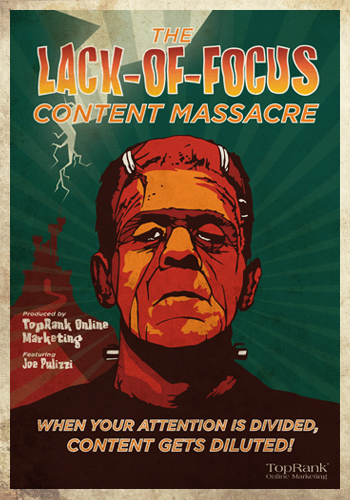
Perhaps the biggest horror story from readers that we continually hear is targeting more than one audience at a time with a content initiative. For example, late last year I was approached by a blog editor that worked for a large technology company. She was frustrated that the blog wasn’t meeting their marketing objectives. I asked her simply, “who is the audience for the blog?” She stated that they target 18 personas. I quickly told her I found the problem.
Even diluting your message through adding just one additional audience group will make it almost impossible for you to be relevant to both. While you are targeting two, three or four audiences, someone out there is becoming the leading informational provider for your core audience target.
Focus is everything.
Jason Miller (@JasonMillerCA)
Group Manager, Content Marketing, LinkedIn
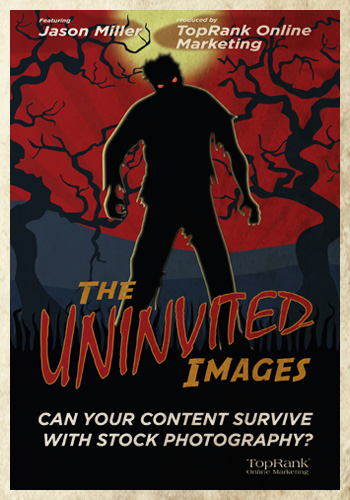
My horror story involves something truly terrifying for many content marketers: stock photography.
I dread using stock photos for any of my content pieces, but in this case the clock was ticking and I was in a pinch. So I went to the very last page on the stock photo site and clicked back a dozen or so pages and chose the best one that fit the content. As a tip, never use stock images from the first 20 or so pages, as those are the images that are EVERYWHERE.
The next day we were minutes away from launching when during one final proof, Alex Rynne on my team discovered that the woman in the stock photo had a mustard stain on her jacket. While we couldn’t exactly take the eBook to the dry cleaner, we did find a replacement in the nick of time and the ebook launched on schedule and performed quite well.
Share Your Spookiest Content Marketing Story
Okay, it’s safe to peek your head above the overs again. The horror stories are over, and we’re safe until the inevitable sequel.
Now it’s your turn to share! We’d love to hear one of your real-life content horror stories and what you learned when it was all said and done.
